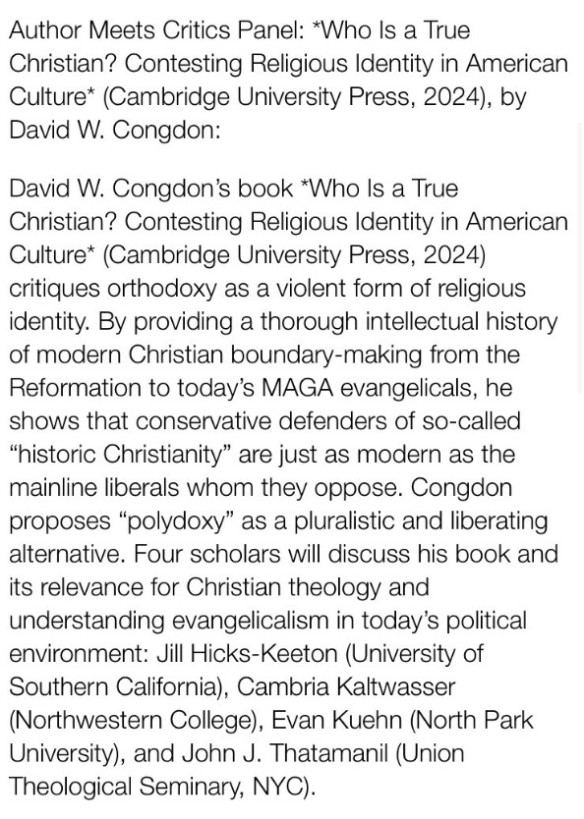Dr. David Congdon has written a new book. Published by Cambridge University Press (2024), it is titled: Who Is a True Christian?: Contesting Religious Identity in American Culture. I have some history with ole’ Congdon, particularly from back in the good old days of the blogosphere. Anyway, his new book might sound provocative; but I don’t think it does, really. Congdon, these days, rejects the bodily resurrection of Jesus Christ; the bodily return of Jesus Christ; a conscious afterlife (eschatological life), so on and so forth. With these identifiable positions, what in God’s green earth qualifies someone like Congdon to write a book on identifying ‘who a true Christian is?’ He has already walked away from any semblance of what the biblical identifier, “Christian,” had come to mean; particularly in the book of Acts. At best, Congdon’s tools for identifying who the true Christian is are going to be those provided for him through sociology. But then in what sort of meaningful way would this give him privy to be a self-proclaimed identifier of who the true Christian is? Being a Christian isn’t a sociological category; it is a revelational-apocalyptic category, indeed, a biblical category. Thusly, its contours and themes, as those might be successfully and intelligibly understood, are purely theological and biblical. As a good Bultmannian, Congdon would and should know all of this. And yet he remains in the mode of deconstruction that he has seemingly been in for years now; long before I came to know him (circa 2006).
Here is the blurb from Congdon’s book:
‘No true Christian could vote for Donald Trump.’ ‘Real Christians are pro-life.’ ‘You can’t be a Christian and support gay marriage.’ Assertive statements like these not only reflect growing religious polarization but also express the anxiety over religious identity that pervades modern American Christianity. To address this disquiet, conservative Christians have sought security and stability: whether by retrieving ‘historic Christian’ doctrines, reconceptualizing their faith as a distinct culture, or reinforcing a political vision of what it means to be a follower of God in a corrupt world. The result is a concerted effort ‘Make Christianity Great Again’: a religious project predating the corresponding political effort to ‘Make America Great Again.’ Part intellectual history, part nuanced argument for change, this timely book explores why the question of what defines Christianity has become, over the last century, so damagingly vexatious – and how believers might conceive of it differently in future.[1]
Call me skeptical. That isn’t to say that Congdon might not offer any good insights or critiques say of evangelical Christianity; or even, mainline Christianity (and yet, Job’s “friends” thought they had good insights on God too). But it is to say, that I find it extremely ironic for someone who is no longer a professing Christian (at best he is a pluralist, something like we find with the late John Hick), to uplift himself as someone who might have the capacity to construct a mechanism that might tell us “Who Is a True Christian.”
The American Academy of Religion (AAR) is having its national-international meeting in San Diego, CA this next Thanksgiving week; along with the Evangelical Theological Society (ETS), and the Society of Biblical Literature (SBL). At these types of theological conferences, they have breakout and panel sessions, devoted to various groups and fellowships within the AAR. There is going to be a panel engaging directly with Congdon’s book, and apparently the panel is made up of critics, at one level or the other. In my view, Congdon’s book doesn’t warrant a panel review and engagement. Now, the AAR is expansive, and as such, has latitude in regard to its membership and focuses. Even so, just because something is published, even if it has acuity and academic eloquence, for my money, this doesn’t in itself warrant a response. I say this because whenever something is responded to in academia it elevates the subject matter, and amplifies its ostensible credibility. I don’t see how Congdon’s book achieves this level of credibility for a theological organization. If anything, it maybe could be paneled at some academic sociological conference, or something; this would be much more fitting. But such has the AAR become.
I simply wanted to acknowledge that this is happening. Congdon still has some influence on various Christians out there, and not for the good. I used to point some of my readers, here at the blog, to some of Congdon’s work in the past. I regret that. And so, I feel like I have some responsibility for alerting folks to what Congdon is doing these days, if only to keep them from falling into the trap of his neo-Gnostic maneuverings within the broader frame of the ‘body of Christ.’
[1] See Congdon, Who Is a True Christian?

